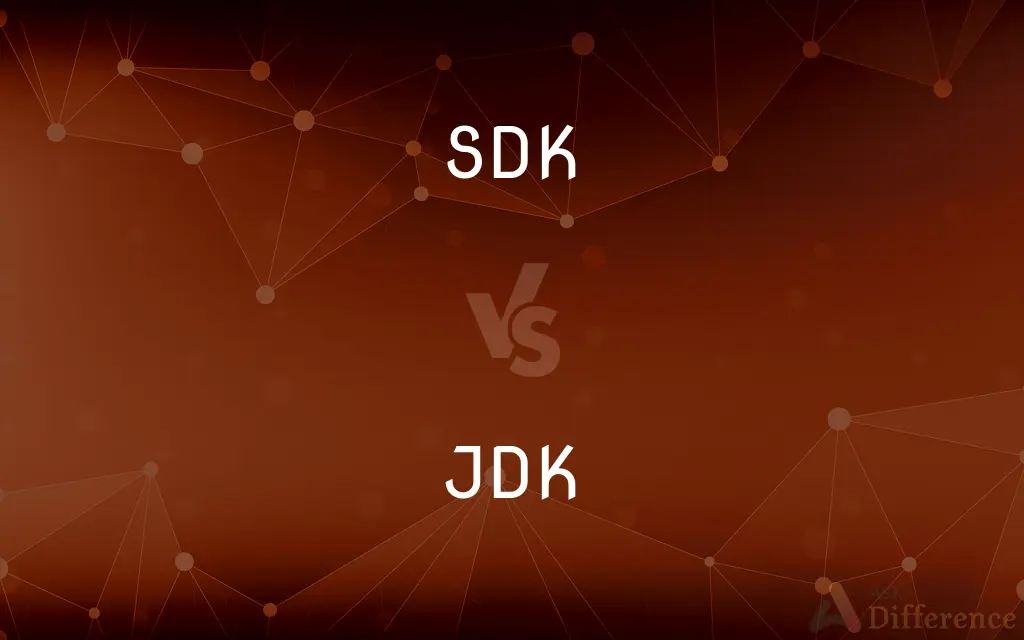SDK vs. JDK — What's the Difference?
Edited by Tayyaba Rehman — By Fiza Rafique — Published on December 31, 2023
SDK stands for Software Development Kit, providing tools to build software for specific platforms, while JDK is Java Development Kit, a specific SDK for Java applications.

Difference Between SDK and JDK
Table of Contents
ADVERTISEMENT
Key Differences
SDK, or Software Development Kit, is a comprehensive set of software tools and programs used by developers to create applications for specific platforms or frameworks. JDK, on the other hand, is Java Development Kit, an SDK specifically tailored for developing Java-based applications.
While the SDK is a generic term that refers to any collection of software development tools tailored for a particular platform or system, JDK is exclusive to Java, encompassing tools, executables, and binaries necessary for Java development. Both SDK and JDK assist developers in building, testing, and debugging their software.
An SDK might include libraries, APIs, IDE (Integrated Development Environment), and other utilities depending on the targeted platform. JDK, a subset of SDK, includes a Java Runtime Environment (JRE), Java compiler (javac), and other Java-specific utilities ensuring smooth Java development. The distinction lies in the fact that while every JDK is an SDK, not every SDK is a JDK.
SDKs are essential for developers wanting to craft software for specific platforms, be it mobile, desktop, or web. They ensure compatibility and functionality on the target platform. JDK, in its niche, empowers Java developers to write once and run everywhere, a core principle of Java, thanks to its platform-independent nature. Both SDK and JDK are quintessential in their respective domains, facilitating seamless software development.
Comparison Chart
Definition
Set of tools for software development on specific platforms
Specific SDK for Java application development
ADVERTISEMENT
Includes
Libraries, APIs, IDE, etc.
JRE, Java compiler, Java libraries
Purpose
Create applications for specified platforms
Create Java-based applications
Scope
Generic, spans across various platforms
Specific to Java programming
Usage
Develop for mobile, desktop, web, etc.
Java-specific software development
Compare with Definitions
SDK
A set of libraries, APIs, and other utilities targeting specific software creation.
The SDK provided essential tools for the app's integration with the OS.
JDK
A package containing tools, executables, and binaries for Java.
The JDK enabled the compilation of Java source code into byte code.
SDK
A bridge between developers and a platform, ensuring smooth software crafting.
Utilizing the correct SDK, developers ensured the app's performance on all targeted devices.
JDK
A specialized SDK for Java application development.
He installed the JDK to begin his Java project.
SDK
A package facilitating the creation, debugging, and testing of applications.
To ensure compatibility, the team used the device's official SDK.
JDK
The go-to toolkit for Java developers to ensure platform-independent software.
The write once, run anywhere principle is achievable thanks to the JDK.
SDK
A collection of software tools and programs for specific platform development.
The mobile game was developed using an Android SDK.
JDK
An environment encompassing the JRE and Java-specific utilities.
With the JDK, developers can ensure their Java apps run consistently across platforms.
SDK
Essential tools ensuring functionality and compatibility of software on its destined platform.
With the SDK's documentation, developers avoided common pitfalls during development.
JDK
A set facilitating the entire lifecycle of Java application development.
JDK's integrated tools streamlined the debugging of the Java application.
Common Curiosities
What is the JDK in relation to the SDK?
JDK, or Java Development Kit, is a specific SDK tailored for Java application development.
What tools are typically found in an SDK?
An SDK might include libraries, APIs, IDE, and other development utilities.
What does SDK stand for?
SDK stands for Software Development Kit.
Is the JDK exclusive to Java development?
Yes, the JDK is exclusively tailored for Java-based application development.
Can we consider every JDK an SDK?
Yes, every JDK is an SDK, but not every SDK is a JDK.
What is the primary purpose of an SDK?
SDK provides tools for developers to build software for specific platforms.
Can an SDK target multiple platforms?
While some SDKs are platform-specific, others can target multiple platforms, depending on their design.
Is the JDK only for Java developers?
Primarily, yes. The JDK is specifically tailored for Java application development.
Are there different versions of SDKs and JDKs?
Yes, both SDKs and JDKs have various versions to cater to different platform versions or Java releases.
Why would a developer use an SDK?
Developers use SDKs to ensure compatibility and functionality of software on specific platforms.
What are the primary components of the JDK?
The JDK primarily includes the Java Runtime Environment (JRE), Java compiler, and Java-specific tools.
Can you run a Java program without the JDK?
While you need the JDK for development and compilation, you can run a Java program with just the JRE.
What's the advantage of using the JDK for Java development?
The JDK allows Java developers to "write once and run everywhere" due to Java's platform-independent nature.
Do all programming languages have their own SDKs?
Not necessarily. While many languages or platforms have SDKs, some might rely on general development tools.
What's the relationship between JDK's JRE and Java applications?
JRE, part of JDK, provides the runtime environment in which Java applications execute.
Share Your Discovery

Previous Comparison
HQ vs. HD
Next Comparison
CDR vs. CDRWAuthor Spotlight
Written by
Fiza RafiqueFiza Rafique is a skilled content writer at AskDifference.com, where she meticulously refines and enhances written pieces. Drawing from her vast editorial expertise, Fiza ensures clarity, accuracy, and precision in every article. Passionate about language, she continually seeks to elevate the quality of content for readers worldwide.
Edited by
Tayyaba RehmanTayyaba Rehman is a distinguished writer, currently serving as a primary contributor to askdifference.com. As a researcher in semantics and etymology, Tayyaba's passion for the complexity of languages and their distinctions has found a perfect home on the platform. Tayyaba delves into the intricacies of language, distinguishing between commonly confused words and phrases, thereby providing clarity for readers worldwide.
















































